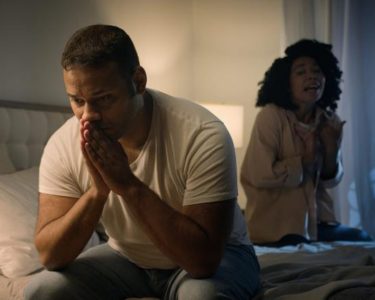NO, YOUR PROBLEMS IN YOUR MARRIAGE AREN’T BECAUSE OF COMMUNICATION
By Hunter English

In the intricate dance of relationships, communication often takes center stage. We hear it time and again: “Communication is key.”
While communication is undeniably important, many couples find themselves stuck in a cycle of talking without truly understanding and empathizing. Have you ever felt like you’re speaking different languages, even when you’re using the same words? Maybe you tell them, your friends, or even therapist, “I’m not feeling heard.” This is where the magic of relationships extends beyond mere communication.
In this blog post, we’ll explore why communication alone isn’t enough and tell you why the essential elements of comprehension, compassion, and active listening are also critically important along with communication. Together, these components create a harmonious symphony that can transform your marriage. And when things get tough, a skilled marriage counselor can guide you through the complexities, helping you build a deeper, more meaningful connection.
Communication
Communication involves more than just exchanging words; it requires creating an environment where both partners feel empowered to express themselves openly and honestly. An environment that ensures all voices are heard and valued equally, giving each partner the opportunity to speak and have their perspectives respected and considered. Non-verbal cues, such as body language and tone, play a significant role in how messages are received and interpreted. However, communication alone cannot resolve all relationship issues. Misunderstandings can still occur, and emotional needs may go unmet if we don’t pair communication with comprehension and compassion.
It’s about more than just talking—it’s about truly connecting. In the following sections, we’ll explore how comprehension, compassion, and active listening can further enhance this connection.
Comprehension
Comprehension is essential in communication as it allows the messages to be accurately received and understood. When we focus on truly comprehending what our partner is saying, we engage in active listening, which involves paying close attention to their words, tone, and non-verbal cues. This attentiveness allows us to grasp the full meaning of their message, reducing the likelihood of misunderstandings. By asking clarifying questions and reflecting back what we’ve heard, we demonstrate our commitment to understanding their perspective. Comprehension goes beyond just hearing words; it involves interpreting and internalizing the message to respond thoughtfully and appropriately. By prioritizing comprehension, we enhance the quality of our interactions, fostering a deeper connection and mutual respect within the relationship.
Compassion
Compassion plays a crucial role in effective communication by fostering an atmosphere of understanding and empathy. When we approach conversations with compassion, we actively listen to our partner’s words and emotions, seeking to understand their perspective without judgment. This empathetic approach encourages openness and honesty, as both partners feel safe to share their thoughts and feelings. By prioritizing compassion, we create a supportive environment where misunderstandings are less likely to occur, and emotional needs are more readily met. Compassionate communication strengthens the bond between partners, as it demonstrates a genuine commitment to understanding and valuing each other’s experiences. In this way, compassion transforms communication from a simple exchange of words into a meaningful connection that nurtures the relationship.
Active listening
By fully engaging with our partner’s words and emotions, we demonstrate respect and validation, which are essential for building trust and intimacy. Active listening involves more than just hearing; it requires us to focus intently, avoid interrupting, and respond thoughtfully. This practice helps us understand our partner’s needs, concerns, and desires, fostering a sense of connection and empathy. In a marriage, where daily stresses and routines can sometimes lead to misunderstandings, active listening serves as a powerful tool to bridge gaps and resolve conflicts. By making our partner feel heard and valued, we create a supportive environment where both individuals can thrive, ultimately strengthening the bond and resilience of the marriage.
How a couples counselor can help you
A marriage counselor can be an invaluable guide for individuals or couples seeking to enhance their communication by integrating compassion, comprehension, and active listening. Through therapy, clients learn that effective communication extends beyond merely exchanging words; it involves a deep, empathetic connection that fosters understanding and trust. Therapists provide a safe space to explore and practice these skills, offering insights and techniques tailored to each unique relationship. By highlighting the importance of compassion, therapists encourage clients to approach conversations with empathy and kindness, while comprehension exercises help them truly understand their partner’s perspective. Active listening is emphasized as a tool to ensure that both parties feel heard and valued. With a therapist’s support, individuals and couples can transform their communication patterns, leading to more fulfilling and resilient relationships. Ultimately, therapy empowers them to build a foundation of mutual respect and emotional intimacy, essential for lasting connection.




